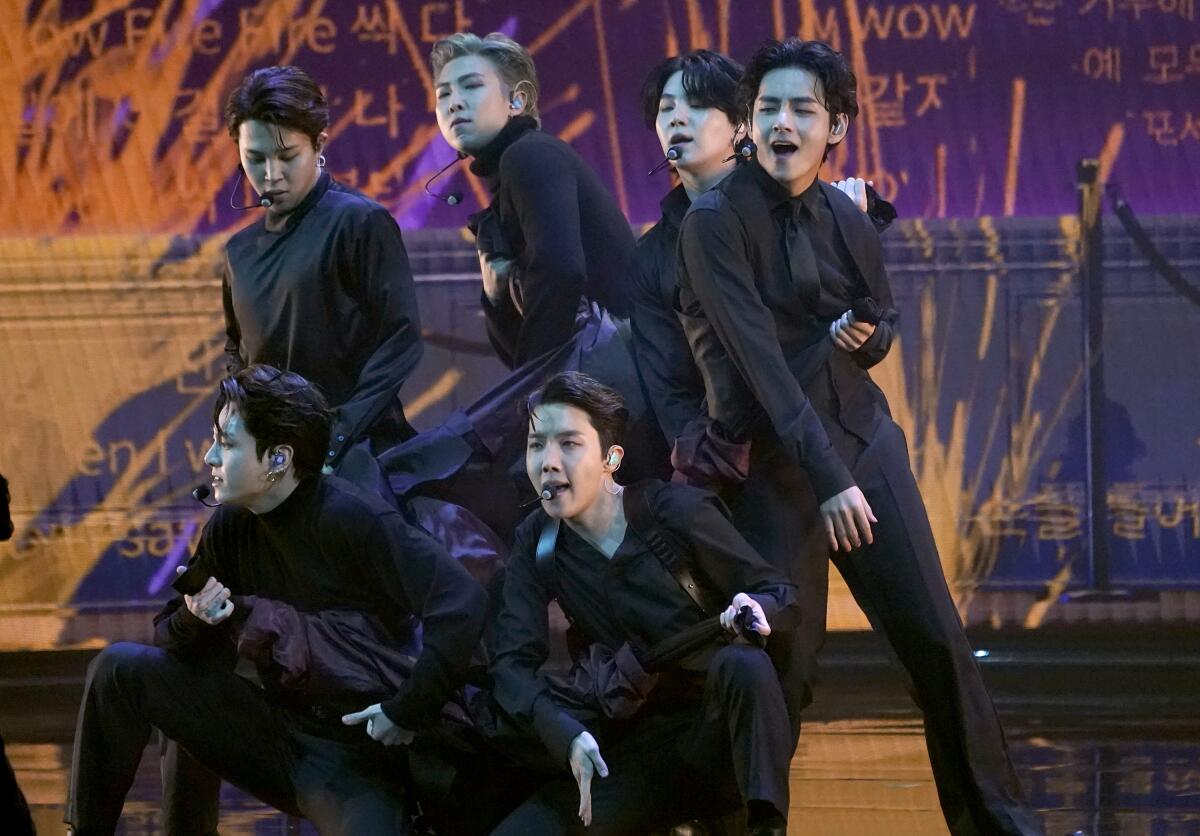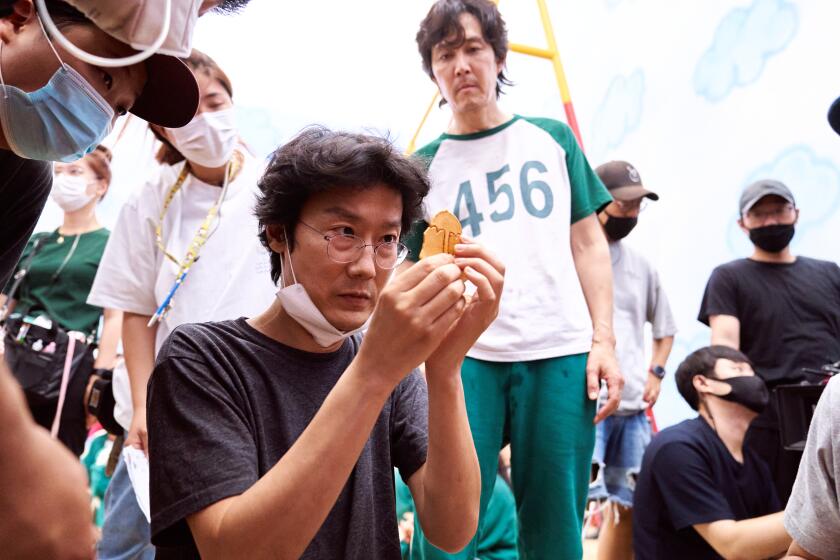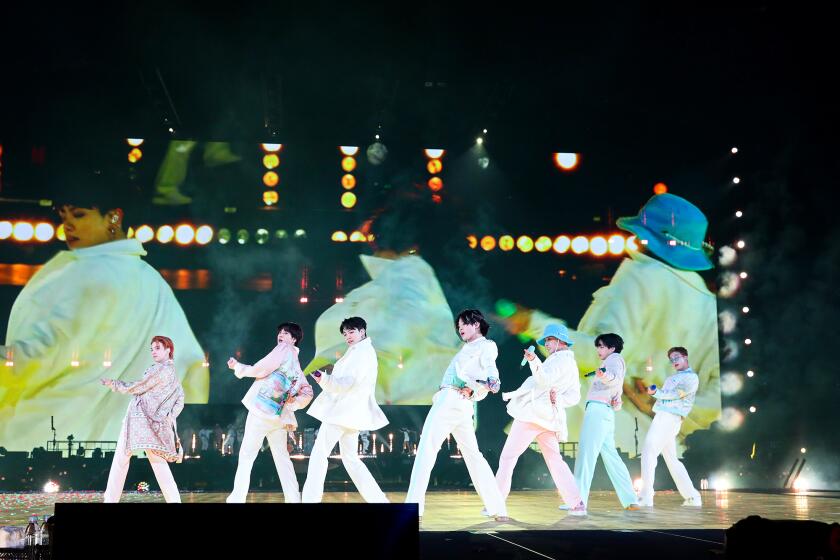Op-Ed: Hollywood, take note: Korean pop culture is here to stay

BTS performs “Butter” at the 64th Grammy Awards on April 3 in Las Vegas.
- Share via
When I saw a selection of Barbie-size BTS dolls prominently displayed recently on the shelves of my neighborhood bookstore, I knew that K-pop had truly made it into the mainstream. As my daughter reached out to grab the Jimin doll, clad in a colorful stage costume, it was clear Korean pop culture had become something much bigger than a passing fascination.
I wouldn’t have imagined this five years ago, when K-pop was still a relatively niche phenomenon. Now young children want to not only sing along to K-pop but also own albums, collect gear, play with K-pop toys and even force their parents to learn the stage names of their favorite idols.
South Korea has fully emerged as a major hub for transnational drama production, filmmaking and pop music production. Even for a fast-moving world driven by pop culture, it is difficult to shift the center of gravity. But K-pop has steadily built its power through its deeply connected fan base.
South Korea has become a major exporter of culture. Its BTS, “Parasite” and now “Squid Game” have captured the world’s imagination and redefined how entertainment transcends borders.
To many of its fans, K-pop culture is not only about fashion, food and entertainment, but also a community where marginalized groups can come together. When it comes to the world of K-pop fandom, women and people of color make up the great majority. For them, part of the appeal is that it stands as an alternative to Western models of pop culture.
The timing of BTS’s breakout onto the global stage merged with the rise of social movements such as #MeToo and Black Lives Matter, which raised marginalized voices. This wasn’t a coincidence. With lyrics that focus on self-love and self-acceptance, the band’s fan base says a big part of the appeal is forming community-like connections among themselves through the group’s music.
Early on, BTS positioned itself as a pop group that was concerned with those social movements. In 2017, the band partnered with UNICEF to launch the “LOVE MYSELF” campaign aimed at protecting children and teenagers from violence and sexual assault. A year later, the band’s fan group, known as ARMY, created several monthly campaigns for charities across the globe.
In 2020, after the murder of George Floyd, BTS and their record label donated $1 million to Black Lives Matter. Their fanbase took to social media with the goal of matching the septet’s donation but ended up surpassing it. Around this time, Black fans of the group began highlighting their experiences with racism on social media and calling attention to their support of BTS with hashtags such as #BlackARMYBeauty, #BlackARMYsequality and #BlackoutBTS.
For the second of four shows in Inglewood, K-pop megastars BTS were joined by Megan Thee Stallion, but the best parts of the concert were the most intimate.
When I arrived in the United States in 1996 from South Korea, most people did not know about South Korea’s thriving pop culture scene. Nor was there any interest in exploring it, even though the Korean pop culture world was brimming with compelling storytellers, consummate artists and unforgiving critics who continuously raised the bar.
It was around the turn of the millennium that Korean entertainment started to spill into neighboring Asian countries, first through Korean films and TV dramas. The rise of YouTube made Korean music widely available beyond its borders and helped propel K-pop bands out of digital platforms to world tours in sold-out stadiums. The age of BTS, rooted in social media, transformed the nature of the Korean cultural boom.
That boom has started to unsettle the conventions of mainstream entertainment in the U.S. It’s been six months since the Korean Netflix series “Squid Game” grabbed a huge global audience. More new Korean dramas like “All of Us Are Dead” have already emerged to top Netflix charts around the world. Netflix has introduced 80 Korean movies and TV shows in the last few years, and global viewing hours for its Korean shows grew six-fold compared with 2019, according to the company.
Of the many factors that made BTS a global phenomenon, being the underdog is part of its story line. As is the case with Bong Joon-ho’s Oscar-winning “Parasite,” the perspective of the underdog in search of getting an “equal share” is what lies at the core of current Korean storytelling. The COVID-19 era intensified the sense of inequality and being left behind. The brutal narrative of a drama like “Squid Game” spoke broadly to global audiences as a parable of this crisis of inequity.
K-pop has unleashed an aesthetic that’s changing tastes, pop culture-based activism, live events and even tie-in products for kids. The question is whether Hollywood and the music industry will be able to surf the Korean wave and understand its qualities — including the visceral storytelling and the diversity of its fans — that give it its power.
Suk-Young Kim is a professor of theater and performance studies at UCLA and the author of “K-pop Live: Fans, Idols, and Multimedia Performance.”
More to Read
A cure for the common opinion
Get thought-provoking perspectives with our weekly newsletter.
You may occasionally receive promotional content from the Los Angeles Times.












